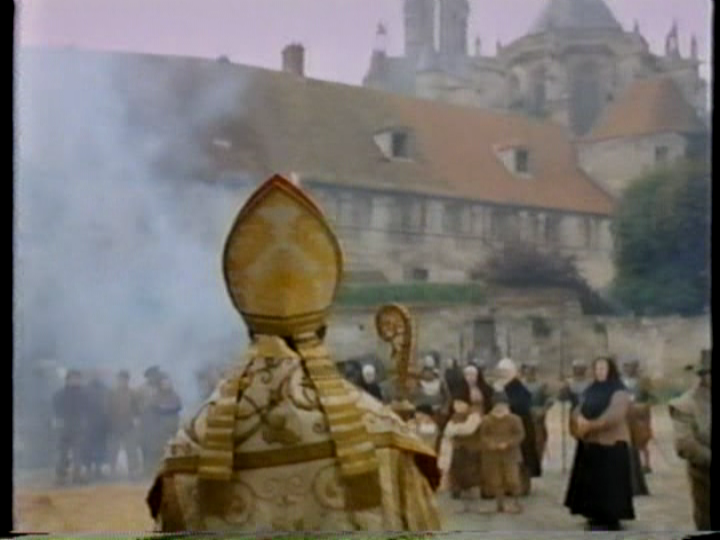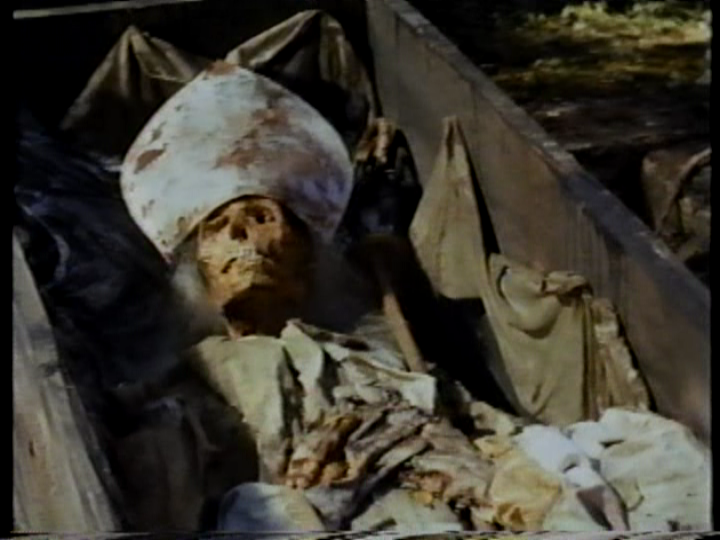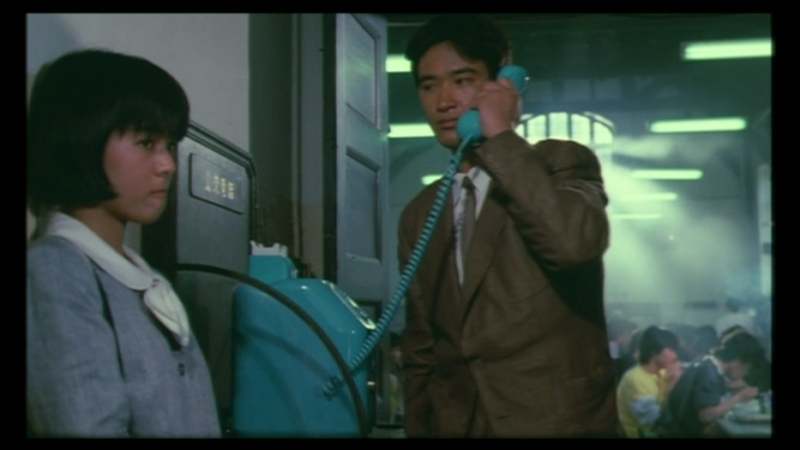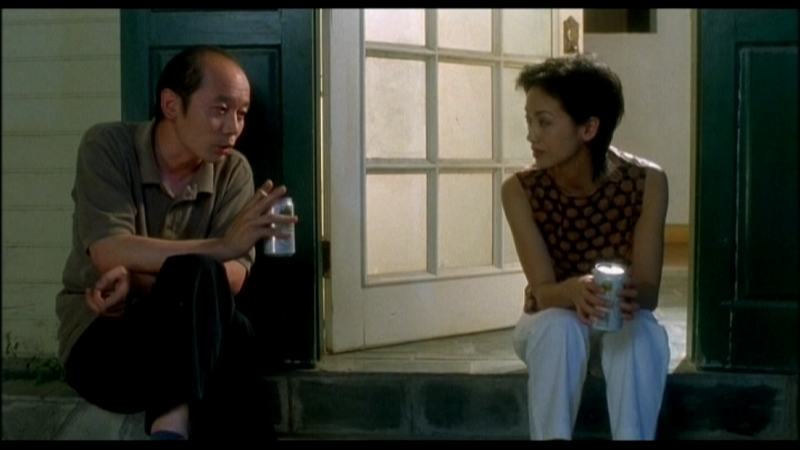Watched February 12-18, 2007
Ani to sono imoto / Older Brother and His Younger Sister (Yasujiro Shimazu, 1939)
Practically a template for post-war Ozu -- by Ozu's (slightly) senior colleague at Shochiku. Shimazu's millieu here (reasonably well off middle class) and domestic dilemmas presented are closer to late Ozu than pre-war Ozu is. Shin Saburi is a salaryman married to Kuniko Miyake (an Ozu mainstay from the 40s through the 60s), with a younger sister (Michiko Kuwano). Saburi has job problems -- and has to worry about marriage prospects of his sister (who is a westernized office girl). Whenever the family runs into problems, they turn to family friend Chishu Ryu (playing a part very like that he plays in Ozu's Early Spring). The solution to the family's woes, however, betrays its era -- a move to Japanese-occupied Manchuria as colonists.
While I could follow this in general terms, I would appreciate seeing a subbed version of this -- something I doubt will happen any time soon.
La voie lactée / The Milky Way (Luis Bunuel, 1969)
An utter delight. Perhaps this poker-faced traversal of Christian orthodoxy and heresy would be mystifying to someone without a grounding in Christian theology and history -- but I found it marvelous. Apparently so did Monty Python -- and it is clear that some of the Python's best work is modeled on this film. This follows two vagabonds making their way to Santiago, to visit the shrine of St. James, but much of the pleasure here lies in the side-trips. One of my favorite moments -- a chorus of little school girls do a recitation of a 6th century string of anathemas.
but much of the pleasure here lies in the side-trips. One of my favorite moments -- a chorus of little school girls do a recitation of a 6th century string of anathemas.
More pictures:
http://i9.photobucket.com/albums/a59/mkerpan/feb_07/milky04.png
http://i9.photobucket.com/albums/a59/mkerpan/feb_07/milky11.png
http://i9.photobucket.com/albums/a59/mkerpan/feb_07/milky12.png
Sailor-fuku to kikanju / Sailor Suit and Machine Gun (Shinji Somai, 1981)
Tantei monogatari / Detective Story (Kichitaro Negishi, 1983)
W no higeki / Tragedy of W (Shinichiro Sawai, 1984)
A mini-festival of early films by (then) young star Hiroko Yakushimaru (seen more recently as the head lady of waiting in Princess Raccoon). HY has been a popular (and award-winning) actress for more than 25 years -- yet remains virtually known outside Asia.
 Ironically, the film I was most eager to see -- Somai's Sailor suit and Machine Gun was least satisfying. While there were more than a few enjoyable sequences, this was sometimes sloppy narratively and visually. (Only hints of the
Ironically, the film I was most eager to see -- Somai's Sailor suit and Machine Gun was least satisfying. While there were more than a few enjoyable sequences, this was sometimes sloppy narratively and visually. (Only hints of the complete mastery Somai would show in his later Ohikkoshi). Still, an interesting cultural artifact of its time, well worth seeing.
complete mastery Somai would show in his later Ohikkoshi). Still, an interesting cultural artifact of its time, well worth seeing.
More screen captures:
http://s9.photobucket.com/albums/a59/mkerpan/sailor/sailor01.png
http://s9.photobucket.com/albums/a59/mkerpan/sailor/sailor02.png
http://s9.photobucket.com/albums/a59/mkerpan/sailor/sailor04.png
http://s9.photobucket.com/albums/a59/mkerpan/sailor/sailor06.png
http://s9.photobucket.com/albums/a59/mkerpan/sailor/sailor07.png
http://s9.photobucket.com/albums/a59/mkerpan/sailor/sailor08.png
http://s9.photobucket.com/albums/a59/mkerpan/sailor/sailor09.png
http://s9.photobucket.com/albums/a59/mkerpan/sailor/sailor10.png
 Detective Story was the most entertaining narratively -- with Yusaku Matsuda (the tutor from Morita's Family Game) as a detective hired to watch over HY (by her absent father) as she prepares to join him in America (leaving all her college pals behind). Due to the involvement of Matsuda's ex-wife with the murder of a gang boss's son, HY winds up aiding (and protecting) Matsuda and his ex-wife -- over the protests of her housekeeper (Kyoko Kishida). HY is a charmer here -- and the story (while improbable) is mostly lots of fun.
Detective Story was the most entertaining narratively -- with Yusaku Matsuda (the tutor from Morita's Family Game) as a detective hired to watch over HY (by her absent father) as she prepares to join him in America (leaving all her college pals behind). Due to the involvement of Matsuda's ex-wife with the murder of a gang boss's son, HY winds up aiding (and protecting) Matsuda and his ex-wife -- over the protests of her housekeeper (Kyoko Kishida). HY is a charmer here -- and the story (while improbable) is mostly lots of fun.
http://i9.photobucket.com/albums/a59/mkerpan/feb_07/detective03.png
http://i9.photobucket.com/albums/a59/mkerpan/feb_07/detective05.png
http://i9.photobucket.com/albums/a59/mkerpan/feb_07/detective07.png
 Tragedy of W had an extemely old-fashioned plot -- one could easily imagine this as a 30s vehicle for Bette Davis or Joan Crawford. HY is a an acting apprentice who loses out in getting a part she desperately wanted (to a friend) -- but winds up getting the part underhandedly, by helping the troupe's leading lady cover up a sordid secret.
Tragedy of W had an extemely old-fashioned plot -- one could easily imagine this as a 30s vehicle for Bette Davis or Joan Crawford. HY is a an acting apprentice who loses out in getting a part she desperately wanted (to a friend) -- but winds up getting the part underhandedly, by helping the troupe's leading lady cover up a sordid secret.  Meanwhile, she has met an engaging young man, who has given up on acting for real estate agenting -- but nonetheless has been smitten by her. This film was clearly HY's declaration of cinematic adulthood -- and so loses her (cinematic) virginity here -- which is a bit disconcerting as she was an extremely young-seeming 20 year old (and could still easily pass for a high school student for at least another 5 years).
Meanwhile, she has met an engaging young man, who has given up on acting for real estate agenting -- but nonetheless has been smitten by her. This film was clearly HY's declaration of cinematic adulthood -- and so loses her (cinematic) virginity here -- which is a bit disconcerting as she was an extremely young-seeming 20 year old (and could still easily pass for a high school student for at least another 5 years).  HY oscillates here between an engagingly natural manner and "over-acting" (though -- given the nature of the part and the story -- I suspect any over-acting was quite intentional). In any event, this is was a very good-looking film:
HY oscillates here between an engagingly natural manner and "over-acting" (though -- given the nature of the part and the story -- I suspect any over-acting was quite intentional). In any event, this is was a very good-looking film:
http://s9.photobucket.com/albums/a59/mkerpan/tragedy_of_w/w01.png
http://s9.photobucket.com/albums/a59/mkerpan/tragedy_of_w/w02.png
http://s9.photobucket.com/albums/a59/mkerpan/tragedy_of_w/w03.png
http://s9.photobucket.com/albums/a59/mkerpan/tragedy_of_w/w07.png
http://s9.photobucket.com/albums/a59/mkerpan/tragedy_of_w/w08.png
http://s9.photobucket.com/albums/a59/mkerpan/tragedy_of_w/w09.png
http://s9.photobucket.com/albums/a59/mkerpan/tragedy_of_w/w10.png
Kai xin gui zhuang gui / Happy Ghost 3 (Johnnie To, 1986)
A very entertaining, and very silly film about ghosts and re-incarnation, starring a very young-looking Maggie Cheung as a soul awaiting re-incarnation, whose re-birth keeps getting mucked up by a hapless high school teacher. As a result, she vows to get revenge, while waiting on her next chance at rebirth. The teacher, on the advice of a friendly ghost, takes steps to avert her wrath, which results in her posthumous success as a singer (she had committed suicide because her career as a singer had met with failure). By this point, the poor teacher is already embroiled in all sorts of problems (including problems with his girl friend, his principal and a mob boss running a bordello which employs school girls).
 Mei wan mei liao / Sorry Baby (Feng Xiaogang, 1999)
Mei wan mei liao / Sorry Baby (Feng Xiaogang, 1999)
GE You is a van driver who works for FU Biao (the hero's sidekick in ZHANG Yimou's Happy Times), a travel bureau operator who likes to pinch pennies by stiffing his employees. To put pressure on his boss, Ge "abducts" Fu's girl friend (Jacqueline Wu) from the hospital where she is being treated for a case of pneumonia. Wu turns the tables on Ge, deciding that this offers her the chance to see whether Fu values his cash or her more. Meanwhile, she discovers just why our hero is so desperate to get the money he is owed. An immensely enjoyable (and likable) work by mainland China's best director of "popular" films.

Practically a template for post-war Ozu -- by Ozu's (slightly) senior colleague at Shochiku. Shimazu's millieu here (reasonably well off middle class) and domestic dilemmas presented are closer to late Ozu than pre-war Ozu is. Shin Saburi is a salaryman married to Kuniko Miyake (an Ozu mainstay from the 40s through the 60s), with a younger sister (Michiko Kuwano). Saburi has job problems -- and has to worry about marriage prospects of his sister (who is a westernized office girl). Whenever the family runs into problems, they turn to family friend Chishu Ryu (playing a part very like that he plays in Ozu's Early Spring). The solution to the family's woes, however, betrays its era -- a move to Japanese-occupied Manchuria as colonists.
While I could follow this in general terms, I would appreciate seeing a subbed version of this -- something I doubt will happen any time soon.
La voie lactée / The Milky Way (Luis Bunuel, 1969)

An utter delight. Perhaps this poker-faced traversal of Christian orthodoxy and heresy would be mystifying to someone without a grounding in Christian theology and history -- but I found it marvelous. Apparently so did Monty Python -- and it is clear that some of the Python's best work is modeled on this film. This follows two vagabonds making their way to Santiago, to visit the shrine of St. James,
 but much of the pleasure here lies in the side-trips. One of my favorite moments -- a chorus of little school girls do a recitation of a 6th century string of anathemas.
but much of the pleasure here lies in the side-trips. One of my favorite moments -- a chorus of little school girls do a recitation of a 6th century string of anathemas.More pictures:
http://i9.photobucket.com/albums/a59/mkerpan/feb_07/milky04.png
http://i9.photobucket.com/albums/a59/mkerpan/feb_07/milky11.png
http://i9.photobucket.com/albums/a59/mkerpan/feb_07/milky12.png
Sailor-fuku to kikanju / Sailor Suit and Machine Gun (Shinji Somai, 1981)
Tantei monogatari / Detective Story (Kichitaro Negishi, 1983)
W no higeki / Tragedy of W (Shinichiro Sawai, 1984)
A mini-festival of early films by (then) young star Hiroko Yakushimaru (seen more recently as the head lady of waiting in Princess Raccoon). HY has been a popular (and award-winning) actress for more than 25 years -- yet remains virtually known outside Asia.
 Ironically, the film I was most eager to see -- Somai's Sailor suit and Machine Gun was least satisfying. While there were more than a few enjoyable sequences, this was sometimes sloppy narratively and visually. (Only hints of the
Ironically, the film I was most eager to see -- Somai's Sailor suit and Machine Gun was least satisfying. While there were more than a few enjoyable sequences, this was sometimes sloppy narratively and visually. (Only hints of the complete mastery Somai would show in his later Ohikkoshi). Still, an interesting cultural artifact of its time, well worth seeing.
complete mastery Somai would show in his later Ohikkoshi). Still, an interesting cultural artifact of its time, well worth seeing.More screen captures:
http://s9.photobucket.com/albums/a59/mkerpan/sailor/sailor01.png
http://s9.photobucket.com/albums/a59/mkerpan/sailor/sailor02.png
http://s9.photobucket.com/albums/a59/mkerpan/sailor/sailor04.png
http://s9.photobucket.com/albums/a59/mkerpan/sailor/sailor06.png
http://s9.photobucket.com/albums/a59/mkerpan/sailor/sailor07.png
http://s9.photobucket.com/albums/a59/mkerpan/sailor/sailor08.png
http://s9.photobucket.com/albums/a59/mkerpan/sailor/sailor09.png
http://s9.photobucket.com/albums/a59/mkerpan/sailor/sailor10.png
 Detective Story was the most entertaining narratively -- with Yusaku Matsuda (the tutor from Morita's Family Game) as a detective hired to watch over HY (by her absent father) as she prepares to join him in America (leaving all her college pals behind). Due to the involvement of Matsuda's ex-wife with the murder of a gang boss's son, HY winds up aiding (and protecting) Matsuda and his ex-wife -- over the protests of her housekeeper (Kyoko Kishida). HY is a charmer here -- and the story (while improbable) is mostly lots of fun.
Detective Story was the most entertaining narratively -- with Yusaku Matsuda (the tutor from Morita's Family Game) as a detective hired to watch over HY (by her absent father) as she prepares to join him in America (leaving all her college pals behind). Due to the involvement of Matsuda's ex-wife with the murder of a gang boss's son, HY winds up aiding (and protecting) Matsuda and his ex-wife -- over the protests of her housekeeper (Kyoko Kishida). HY is a charmer here -- and the story (while improbable) is mostly lots of fun.http://i9.photobucket.com/albums/a59/mkerpan/feb_07/detective03.png
http://i9.photobucket.com/albums/a59/mkerpan/feb_07/detective05.png
http://i9.photobucket.com/albums/a59/mkerpan/feb_07/detective07.png
 Tragedy of W had an extemely old-fashioned plot -- one could easily imagine this as a 30s vehicle for Bette Davis or Joan Crawford. HY is a an acting apprentice who loses out in getting a part she desperately wanted (to a friend) -- but winds up getting the part underhandedly, by helping the troupe's leading lady cover up a sordid secret.
Tragedy of W had an extemely old-fashioned plot -- one could easily imagine this as a 30s vehicle for Bette Davis or Joan Crawford. HY is a an acting apprentice who loses out in getting a part she desperately wanted (to a friend) -- but winds up getting the part underhandedly, by helping the troupe's leading lady cover up a sordid secret.  Meanwhile, she has met an engaging young man, who has given up on acting for real estate agenting -- but nonetheless has been smitten by her. This film was clearly HY's declaration of cinematic adulthood -- and so loses her (cinematic) virginity here -- which is a bit disconcerting as she was an extremely young-seeming 20 year old (and could still easily pass for a high school student for at least another 5 years).
Meanwhile, she has met an engaging young man, who has given up on acting for real estate agenting -- but nonetheless has been smitten by her. This film was clearly HY's declaration of cinematic adulthood -- and so loses her (cinematic) virginity here -- which is a bit disconcerting as she was an extremely young-seeming 20 year old (and could still easily pass for a high school student for at least another 5 years).  HY oscillates here between an engagingly natural manner and "over-acting" (though -- given the nature of the part and the story -- I suspect any over-acting was quite intentional). In any event, this is was a very good-looking film:
HY oscillates here between an engagingly natural manner and "over-acting" (though -- given the nature of the part and the story -- I suspect any over-acting was quite intentional). In any event, this is was a very good-looking film:http://s9.photobucket.com/albums/a59/mkerpan/tragedy_of_w/w01.png
http://s9.photobucket.com/albums/a59/mkerpan/tragedy_of_w/w02.png
http://s9.photobucket.com/albums/a59/mkerpan/tragedy_of_w/w03.png
http://s9.photobucket.com/albums/a59/mkerpan/tragedy_of_w/w07.png
http://s9.photobucket.com/albums/a59/mkerpan/tragedy_of_w/w08.png
http://s9.photobucket.com/albums/a59/mkerpan/tragedy_of_w/w09.png
http://s9.photobucket.com/albums/a59/mkerpan/tragedy_of_w/w10.png
Kai xin gui zhuang gui / Happy Ghost 3 (Johnnie To, 1986)
A very entertaining, and very silly film about ghosts and re-incarnation, starring a very young-looking Maggie Cheung as a soul awaiting re-incarnation, whose re-birth keeps getting mucked up by a hapless high school teacher. As a result, she vows to get revenge, while waiting on her next chance at rebirth. The teacher, on the advice of a friendly ghost, takes steps to avert her wrath, which results in her posthumous success as a singer (she had committed suicide because her career as a singer had met with failure). By this point, the poor teacher is already embroiled in all sorts of problems (including problems with his girl friend, his principal and a mob boss running a bordello which employs school girls).
 Mei wan mei liao / Sorry Baby (Feng Xiaogang, 1999)
Mei wan mei liao / Sorry Baby (Feng Xiaogang, 1999)GE You is a van driver who works for FU Biao (the hero's sidekick in ZHANG Yimou's Happy Times), a travel bureau operator who likes to pinch pennies by stiffing his employees. To put pressure on his boss, Ge "abducts" Fu's girl friend (Jacqueline Wu) from the hospital where she is being treated for a case of pneumonia. Wu turns the tables on Ge, deciding that this offers her the chance to see whether Fu values his cash or her more. Meanwhile, she discovers just why our hero is so desperate to get the money he is owed. An immensely enjoyable (and likable) work by mainland China's best director of "popular" films.
Comments